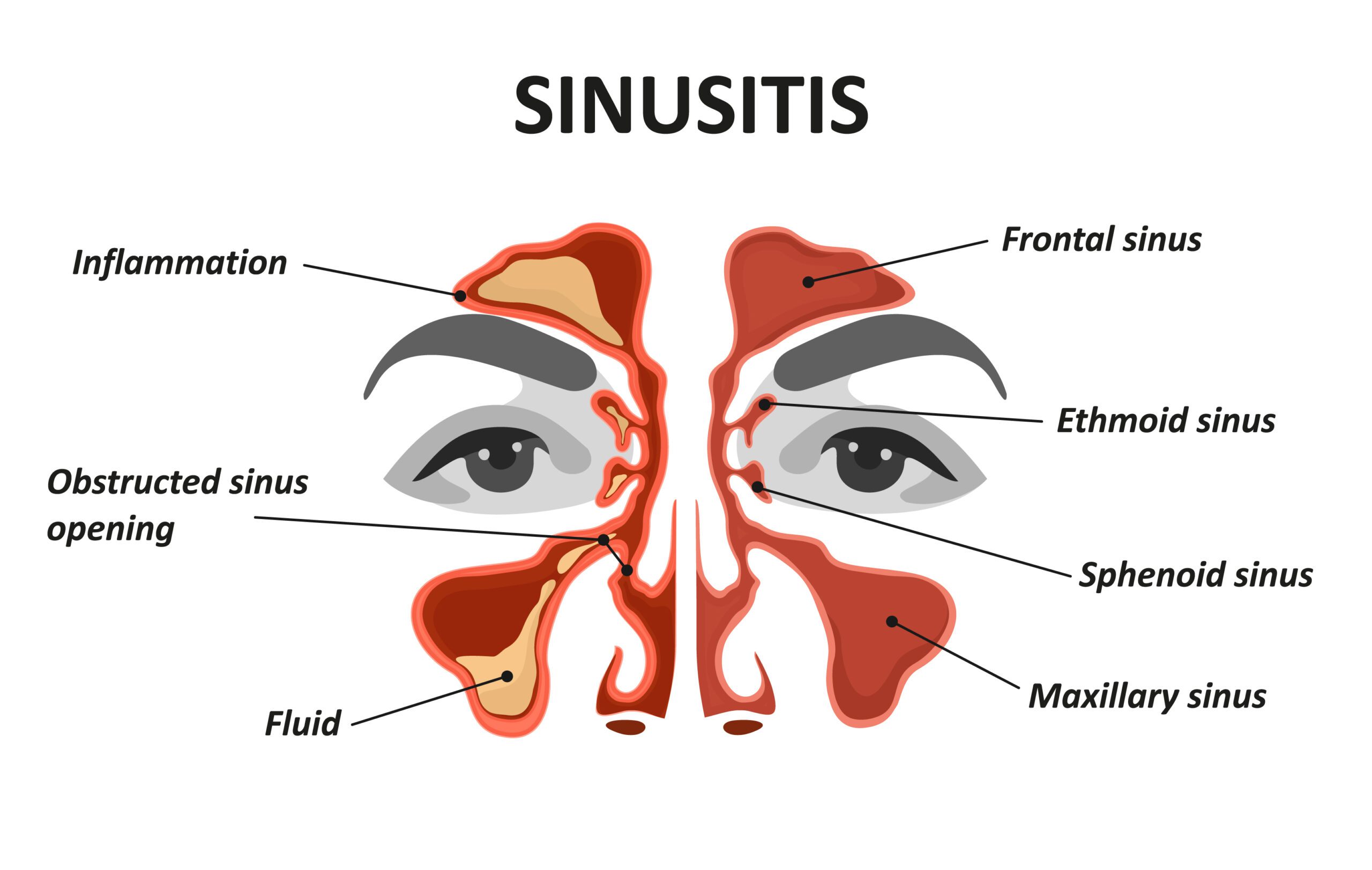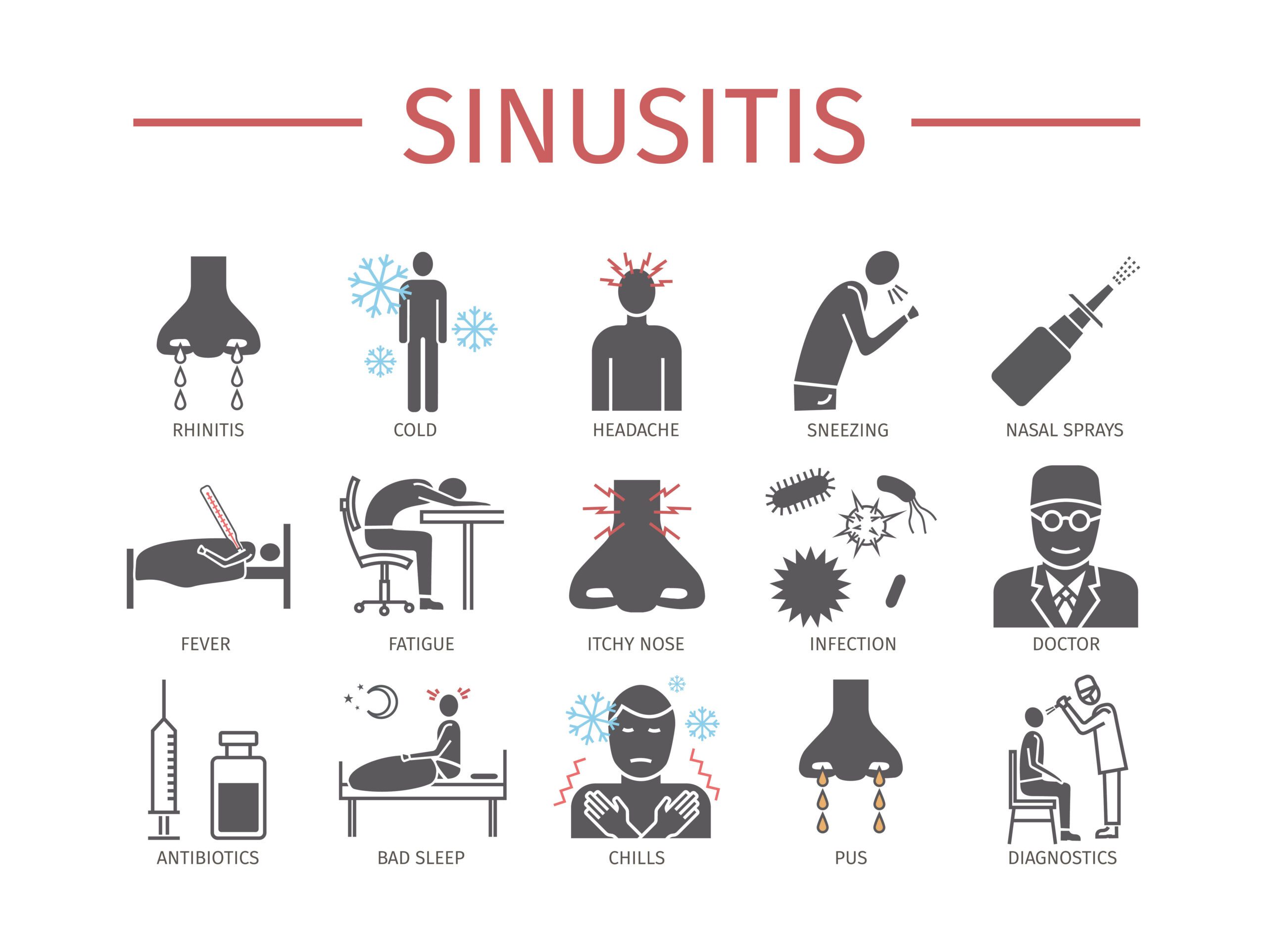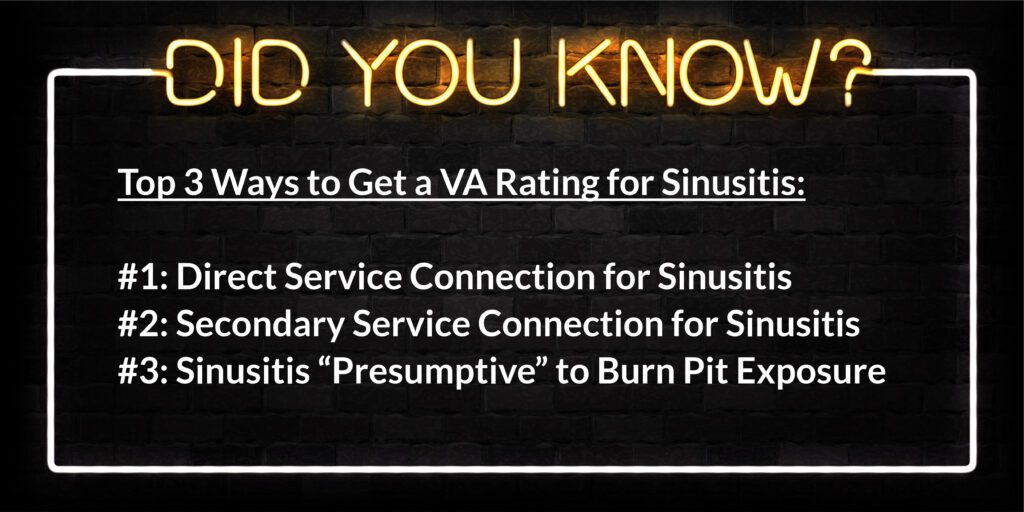Looking for Expert-Level VA Claim Answers?📱Call Us Now! 737-295-2226
In this Insider’s Guide, we’ll explore how to get a Sinusitis VA Rating even if you’ve already filed or been denied benefits in the past.
VA Disability for Sinusitis ranges from 0% to 50%, with breaks at 10% and 30%.

The highest scheduler VA Disability Rating for Sinusitis is 50 percent, with symptoms such as:
- Following radical surgery with chronic osteomyelitis (bone infection), OR
- Near constant Sinusitis characterized by headaches, pain and tenderness of affected sinus, and purulent discharge (white, yellow, or brown fluid slightly thick in texture) OR crusting after repeated surgeries.
Your final VA Rating for Sinusitis depends upon the Frequency, Severity, and Duration of symptoms and any impairment or loss (e.g., work impacts).
It’s important to note that the VA will only rate Chronic Sinusitis, NOT Acute Sinusitis (more on that below).
Veterans who suffer from Chronic Sinusitis have an increased risk of developing Obstructive Sleep Apnea, in which case, you can file a VA claim for Sleep Apnea secondary to Sinusitis.
Okay, let’s jump into this Insider’s Guide for getting a service-connected disability rating for Sinusitis.
Table of Contents
You DESERVE a HIGHER VA rating.
Take advantage of a VA Claim Discovery Call with an experienced Team Member. Learn what you’ve been missing so you can FINALLY get the disability rating and compensation you’ve earned for your service.
What is Sinusitis in Veterans?

In simple terms, Sinusitis is a sinus infection.
If you get sinus infections often and for a sustained period, they’re considered “chronic.”
Chronic Sinusitis, also called “Chronic Rhinosinusitis,” arises when the spaces on the inside of your nose and head become swollen and inflamed for three months or longer, regardless of medical treatment.
Chronic Sinusitis is a common condition in veterans, especially those exposed to burn pits; it interferes with the way mucus drains, leaving you with a stuffy nose.
Thus, breathing through your nose might be difficult, and the area around your eyes could be swollen or tender.
Chronic Sinusitis can come about by an infection, nasal polyps, or swelling of the inner lining of your sinuses.
There are two primary types of Sinusitis:
- Acute Sinusitis usually lasts between 7-10 days and is mostly caused by the common cold. Acute Sinusitis causes your sinuses to become inflamed and swollen.
- Chronic Sinusitis lasts for more than 3 months, even with medical treatment. Chronic Sinusitis has the same symptoms as Acute Sinusitis, except that the former lasts longer and doesn’t usually respond to medical treatment.
Common Signs and Symptoms of Sinusitis:

According to the Mayo Clinic, symptoms of Sinusitis in veterans include:
- Nasal inflammation
- Runny nose with thick, discolored discharge
- Drainage down the back of the throat
- Stuffy nose, making it hard to breathe
- Pain, tenderness, or swelling around your eyes, cheeks, nose, or forehead
- Decreased sense of taste and smell
- Earaches
- Headaches
- Pain in the upper jaw and teeth
- Cough, to include throat-clearing
- Sore throat
- Bad breath
- Fatigue
VA Rating for Sinusitis: Basic Eligibility Criteria

To be eligible for a Chronic Sinusitis VA Rating, a veteran must meet three (3) criteria by law:
- #1. Medical diagnosis of Chronic Sinusitis, in a medical record (Service Treatment Records, VA medical records, or private medical records)
- #2. Your Sinusitis was caused or made worse by your active-duty military service OR by another service-connected disability for secondary service connection (“Nexus” for service connection)
- #3. Persistent and recurring symptoms of Sinusitis (“Severity of Symptoms”) in terms of Frequency, Severity, and Duration to include any functional impacts.
If you think you have Chronic Sinusitis, but don’t have a medical diagnosis, pick up the phone and call the VA health facility nearest you to make an appointment right away!
If you’re trying to increase your VA rating for Sinusitis, you need to prove to the VA that your symptoms are now worse and warrant the higher rating criteria by law.
The #1 best way to increase your VA rating for Sinusitis is to have objective medical evidence to show your symptoms have worsened over time.
Is Sinusitis a VA Disability?

Yes, Sinusitis is a VA disability, and it can be rated at 0%, 10%, 30%, or 50%, depending on the severity of your symptoms.
However, your Sinusitis must be considered “Chronic” to be eligible for VA disability benefits.
The VA rates Sinusitis under CFR 38, Part 4, VA Schedule of Ratings, Diagnostic Code 6510, Sinusitis, Pansinusitis, Chronic.
How Do I Get a Sinusitis VA Rating?

There are 3 primary ways a veteran can get a VA disability rating for Sinusitis (Chronic):
#1: Direct Service Connection for Sinusitis with a rating of 0%, 10%, 30%, or 50%. This means an in-service event, injury, or disease related to your military service caused you to develop Sinusitis.
#2: Secondary Service Connection for Sinusitis with a rating of 0%, 10%, 30%, or 50%. For example, a veteran can be rated for Sinusitis secondary to a Deviated Septum.

#3: Sinusitis “Presumptive” to Burn Pit Exposure with a rating of 0%, 10%, 30%, or 50%. If you served in the Gulf War region during the presumptive period, the VA assumes your Sinusitis is related to burn pits. The presumptive period for particulate matter exposure is Afghanistan, Djibouti, Syria, and Uzbekistan during the Persian Gulf War, from September 19, 2001, to the present, OR the Southwest Asia theater of operations from August 2, 1990, to the present. To be eligible for presumptive VA benefits, you must have developed Sinusitis within 10 years of your separation from active duty military service.
What is the Reasonable Doubt Rule for Sinusitis?

The reasonable doubt rule, also known as the Benefit of the Doubt Doctrine, means that the evidence provided by the veteran must only persuade the decision-maker that each factual matter is “at least as likely as not.”
This means there’s a 50/50 chance.
When, after careful consideration of all evidence, a reasonable doubt arises regarding service origin, the degree of disability, or any other point, such doubt will be resolved in favor of the veteran.
The courts further likened the reasonable doubt rule as akin to the principle in baseball that the “tie goes to the runner.”
When in doubt, the benefit is ALWAYS given to the veteran.
Independent providers and C&P examiners must consider and give weight to the veteran’s self-reported symptoms when completing their DBQ for Sinusitis.
What Are the VA Disability Ratings for Sinusitis?

- 50 Percent VA Rating for Sinusitis: Following radical surgery with chronic osteomyelitis (bone infection), or near constant Sinusitis (sinus infections) characterized by headaches, pain and tenderness of affected sinus, and purulent discharge or crusting after repeated surgeries.
- 30 Percent VA Disability Rating for Sinusitis: Three or more incapacitating episodes per year of Sinusitis requiring prolonged (lasting four to six weeks) antibiotic treatment, or more than six non-incapacitating episodes per year of Sinusitis characterized by headaches, pain, and purulent discharge or crusting.
- 10 Percent VA Disability for Sinusitis: One or two incapacitating episodes per year of Sinusitis requiring prolonged (lasting four to six weeks) antibiotic treatment, or three to six non-incapacitating episodes per year of Sinusitis characterized by headaches, pain, and purulent discharge or crusting.
- 0 Percent Rating for Sinusitis: Detected by X-ray only. No other symptoms.
Note: An “incapacitating episode” of Sinusitis means you require bed rest and treatment by a physician.
Pro Tip: Were you exposed to Burn Pits? If you served in Afghanistan, Southwest Asia or certain other regions and developed sinusitis, rhinitis, rhinosinusitis, or asthma within 10 years from your separation from active duty service, these respiratory conditions are presumed to be service-connected. This is especially big news for Afghan war veterans.
What Are VA Secondary Conditions to Sinusitis?

It’s possible for your Sinusitis to be caused or made worse by another service connected disability for secondary service connection.
Here’s a list of common VA secondary conditions to Sinusitis:
- Weakened immune system from other illnesses or medications taken to manage your service-connected disabilities.
What Should I Expect at a VA C&P Exam for Sinusitis?

A C&P exam for Sinusitis involves a series of verbal questions, including a physical examination and diagnostic testing (X-rays, CT scans, or MRIs, if none have been performed).
The following is a list of common questions asked at a VA C&P exam for Sinusitis, based on the DBQ for Sinusitis:
#1. Does the veteran now have, or has he/she ever been diagnosed with Sinusitis?
If yes, describe the history and onset of the condition.
#2. What are the sinuses affected by Chronic Sinusitis?
- None
- Maxillary
- Frontal
- Ethmoid
- Sphenoid
- Pansinusitis
#3. Does the veteran currently have any findings, signs, or symptoms attributable to Chronic Sinusitis?
If yes, check all that apply:
- Chronic sinusitis detected only by imaging studies (See Diagnostic Testing Section)
- Episodes of sinusitis
- Near constant sinusitis (If checked, describe frequency)
- Headaches
- Pain of affected sinus
- Tenderness of affected sinus
- Purulent discharge
- Crushing
- Other (describe)
#4. Has the veteran had NON-INCAPACITATING episodes of Sinusitis characterized by headaches, pain, and purulent discharge or crusting in the past 12 months?
If yes, provide the total number of non-incapacitating episodes over the past 12 months.
#5. Has the veteran had INCAPACITATING episodes of Sinusitis requirement prolonged (4 to 6 weeks) of antibiotics treatment in the past 12 months?
If yes, provide the total number of incapacitating episodes of sinusitis requiring prolonged (4 to 6 weeks) of antibiotic treatment over the past 12 months.
#6. Has the veteran had sinus surgery?
If yes, indicate the type of surgery and results.
#7. Are there any other pertinent findings of Chronic Sinusitis?
#8. Have imaging studies of the sinuses or other areas been performed?
If yes, indicate the type and results.
#9. Is there any evidence of a Deviated Septum?
#10. Does the veteran’s Chronic Sinusitis impact his/her ability to work?
If yes, describe the impact of each of the veteran’s sinus, nose, throat, larynx, or pharynx conditions, providing one or more examples.
Deserve a HIGHER VA Rating? WE CAN HELP.
Join our premier education-based membership program, VA Claims Insider Elite, connect with an expert-level Veteran Coach (VC) within minutes, and finally get the rating you deserve. Click the button below to get started.
About the Author

Brian Reese
Brian Reese is a world-renowned VA disability benefits expert and the #1 bestselling author of VA Claim Secrets and You Deserve It. Motivated by his own frustration with the VA claim process, Brian founded VA Claims Insider to help disabled veterans secure their VA disability compensation faster, regardless of their past struggles with the VA. Since 2013, he has positively impacted the lives of over 10 million military, veterans, and their families.
A former active-duty Air Force officer, Brian has extensive experience leading diverse teams in challenging international environments, including a combat tour in Afghanistan in 2011 supporting Operation ENDURING FREEDOM.
Brian is a Distinguished Graduate of Management from the United States Air Force Academy and earned his MBA from Oklahoma State University’s Spears School of Business, where he was a National Honor Scholar, ranking in the top 1% of his class.




